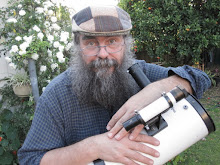Monday, February 18, 2019
The Sky This Week - Thursday February 21 to Thursday February 28
The Last Quarter Moon is Tuesday, February 26. Mars is visible low in
the evening skies. Jupiter is high in the morning skies above Saturn and bright Venus. The waning Moon is close to Jupiter on the 28th. Saturn pulls away from Venus over the week. Comet
C/2018 Y1 (Iwamoto) is be bright enough to be easily seen in
binoculars but moonlight interferes early in the week.
Last Quarter Moon is Tuesday, February 26.
Morning sky on Thursday, February 28 looking east as seen from
Adelaide at 5:32 ACDST (90 minutes before sunrise). Jupiter is high in the morning sky above the pair of Venus and Saturn below
it. At this time Venus and Saturn are moving away from each other. The left
upper insert inset shows the telescopic
view of Venus at this time. the lower left insert shows the telescopic
view of Jupiter at the same scale and the lower right that of Saturn.
Similar views will be seen elsewhere in Australia at the equivalent local time (90 minutes before sunrise).
Evening sky on Saturday, February 23 as seen looking north-west from
Adelaide
at 21:30 ACDST (90 minutes after sunset). Mars is the brightest object
above the western horizon.
The Pleiades and Hyades also grace the north-western sky.
Similar views will be seen throughout Australia at the equivalent local time (90 minutes after sunset, click to embiggen).
Comet C/2018 Y1 as seen looking north from Adelaide at 21:30 ACDST (90 minutes after sunset) on Saturday, February 23, when the comet is highest. Similar views will be seen in elsewhere in Australia at the equivalent local time (90 minutes after sunset,click to embiggen).
C/2018 Y1 is a "bright" comet that should be readily visible in binoculars, however, at the beginning of the week the Moon interferes significantly with seeing it. Later in the week the comet is well placed for viewing. However this is the last week of good viewing from Australia.
More details and black and white charts suitable for printing are here.
Venus is bright in the morning skies below Jupiter and Saturn. The pair are closest on the 19th. but are now moving away from each other as Saturn climbs higher.
Mercury is lost in the twilight
Jupiter climbs higher in the morning sky. On the morning of the 28t the waning Mon is clsoe to Jupiter.
Mars is in Pisces and is readily seen as the brightest object in the western evening sky. Mars sets around 10:30pm.
Saturn is climbs higher in the morning sky heading away from Venus.
Printable PDF maps of the Eastern sky at 10 pm AEDST, Western sky at 10 pm AEDST. For further details and more information on what's up in the sky, see Southern Skywatch.
Cloud cover predictions can be found at SkippySky.
Here is the near-real time satellite view of the clouds (day and night) http://satview.bom.gov.au/
Last Quarter Moon is Tuesday, February 26.
Similar views will be seen elsewhere in Australia at the equivalent local time (90 minutes before sunrise).
The Pleiades and Hyades also grace the north-western sky.
Similar views will be seen throughout Australia at the equivalent local time (90 minutes after sunset, click to embiggen).
Comet C/2018 Y1 as seen looking north from Adelaide at 21:30 ACDST (90 minutes after sunset) on Saturday, February 23, when the comet is highest. Similar views will be seen in elsewhere in Australia at the equivalent local time (90 minutes after sunset,click to embiggen).
C/2018 Y1 is a "bright" comet that should be readily visible in binoculars, however, at the beginning of the week the Moon interferes significantly with seeing it. Later in the week the comet is well placed for viewing. However this is the last week of good viewing from Australia.
More details and black and white charts suitable for printing are here.
Venus is bright in the morning skies below Jupiter and Saturn. The pair are closest on the 19th. but are now moving away from each other as Saturn climbs higher.
Mercury is lost in the twilight
Jupiter climbs higher in the morning sky. On the morning of the 28t the waning Mon is clsoe to Jupiter.
Mars is in Pisces and is readily seen as the brightest object in the western evening sky. Mars sets around 10:30pm.
Saturn is climbs higher in the morning sky heading away from Venus.
Printable PDF maps of the Eastern sky at 10 pm AEDST, Western sky at 10 pm AEDST. For further details and more information on what's up in the sky, see Southern Skywatch.
Cloud cover predictions can be found at SkippySky.
Here is the near-real time satellite view of the clouds (day and night) http://satview.bom.gov.au/
Labels: weekly sky






 Click to read about or order
Click to read about or order Click to read about or order
Click to read about or order Click to read about or order
Click to read about or order Click to read about or order
Click to read about or order




